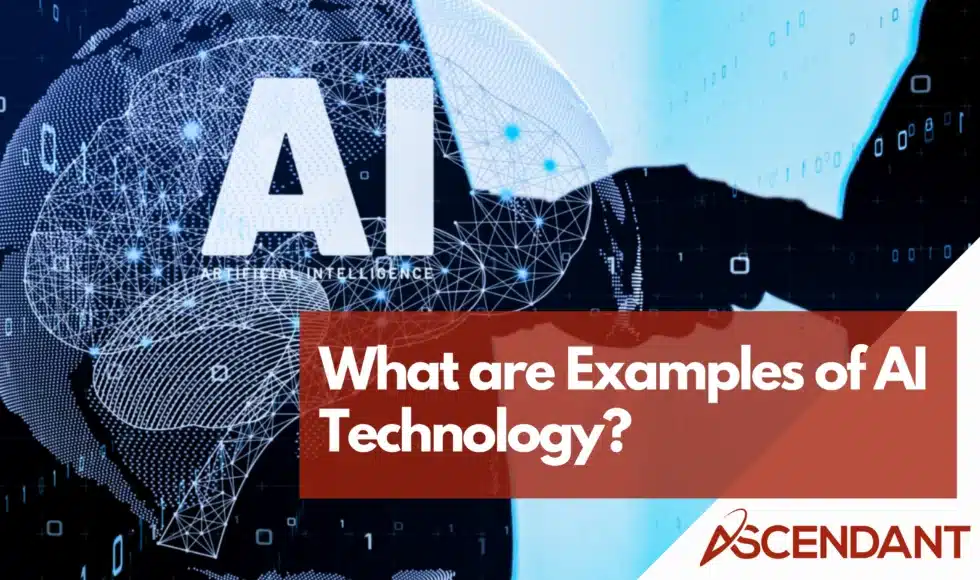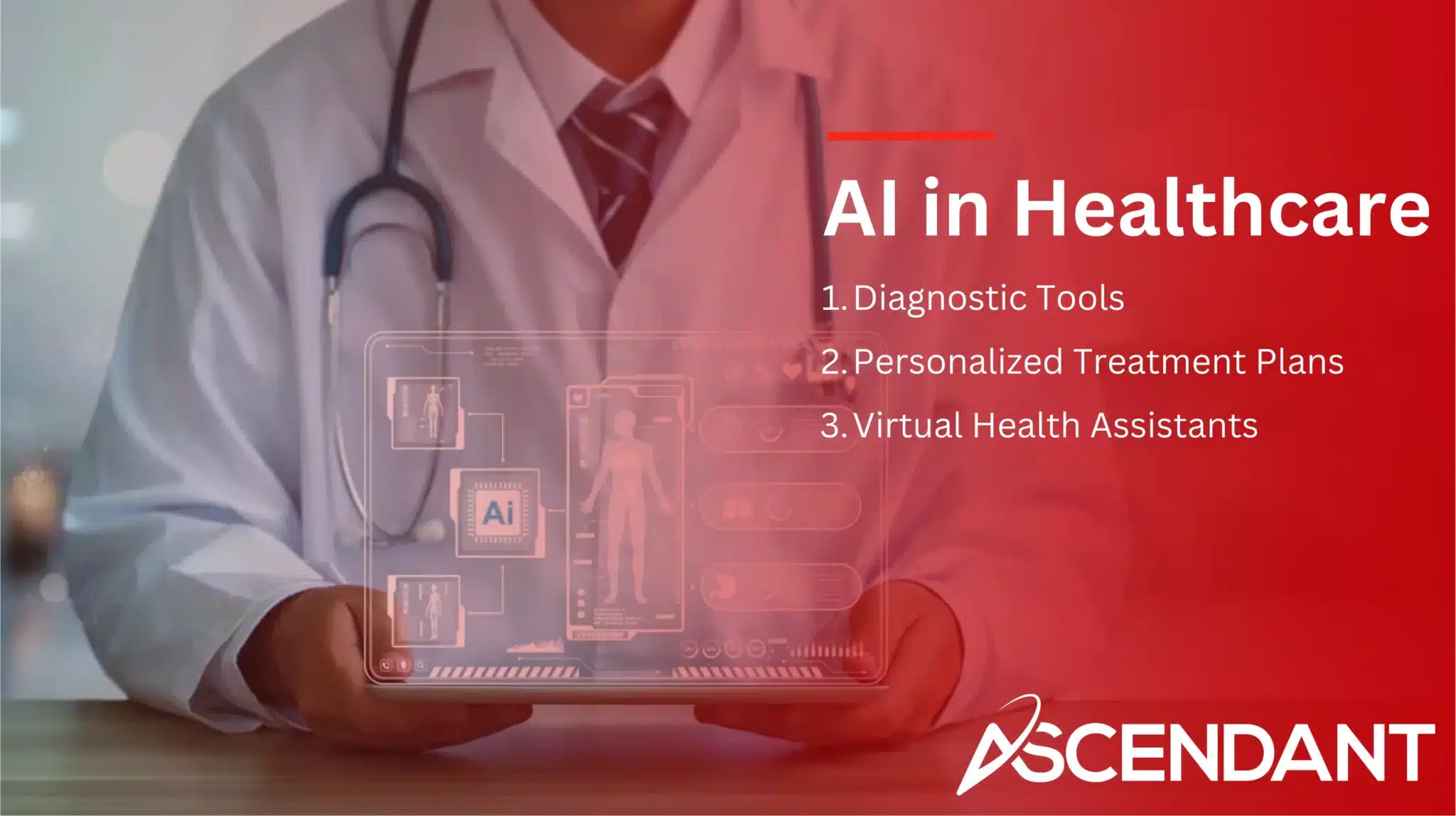AI technology permeates every aspect of our existence, transforming the manner in which we conduct life, perform jobs, and engage in leisure activities. Examples of AI can be found from intelligent virtual assistants embedded within our gadgets to the diagnostic instruments empowered by AI utilized within medical facilities. This composition explores a wide array of applications for AI technology including its influence on sectors such as health services, financial systems, entertainment industries, as well as everyday comforts and conveniences.
Key Takeaways
- AI is deeply integrated into daily life through digital assistants, recommendation systems, and social media personalization, despite many users being unaware of its prevalence.
- In healthcare, AI enhances diagnostic accuracy, personalizes treatment plans, and streamlines administrative tasks with virtual health assistants, improving patient care.
- The financial sector leverages AI for fraud detection, automated trading, and customer relationship management, significantly improving decision-making and service efficiency.
AI in Everyday Life
Artificial intelligence is now a fundamental part of daily life, changing how we live and interact. Many people remain unaware of how often they encounter AI and the role of human intelligence in this interaction. Though only 33% think they use AI, more than 77% engage with AI services or devices every day, illustrating its subtle omnipresence.
From personalized recommendations on streaming platforms like Netflix to AI-powered writing tools like Grammarly, AI technology continually evolves, enhancing production processes and creating immersive experiences across various fields.
Digital Assistants
Some of the most prominent AI applications can be seen in digital assistants such as Siri, Alexa, Cortana, Google Assistant, and Bixby. These tools aid in simplifying everyday activities by managing schedules, automating tasks, entertaining users and handling smart home device control.
Take Amazon’s Alexa for example. It acts as a voice-controlled assistant that not only manages smart gadgets but also carries out an array of functions due to its wide-ranging integration with numerous services.
Social Media Personalization
Algorithms powered by AI are integral to customizing the user experience on social networking sites. They scrutinize the actions of users, tailoring suggestions for content, advertising, and potential contacts accordingly to heighten engagement levels. Social media entities such as Facebook and TikTok deploy these algorithms to assemble customized feeds that resonate with individual tastes and preferences.
Such detailed customization serves a dual purpose. It not only maintains high levels of user involvement but is also instrumental in identifying counterfeit news stories, thereby enhancing the quality of the overall experience for users.
Recommendations Systems
AI systems are crucial in customizing user interactions across diverse platforms, tailoring experiences to individual preferences. For instance, online retailers implement AI-driven recommendation engines that propose items based on a consumer’s past purchases and search history. Spotify similarly utilizes AI technology to scrutinize users’ music listening patterns and endorse tracks that suit their personal tastes.
Likewise, Netflix uses advanced AI capabilities to refine its streaming service by examining subscriber viewing behaviors to recommend films and television series they might find appealing. Such AI-powered engines offer bespoke recommendations which enrich the daily engagements of users with more personalized content.
AI in Healthcare
The incorporation of AI tools in the healthcare sector is revolutionizing how services are delivered and patient results are improved. By facilitating the rapid examination of extensive medical data, these tools aid in achieving quicker and more precise diagnostic conclusions. This shift can be seen across a range of uses, including diagnostic instruments, tailored treatment protocols, and virtual health aides that optimize administrative operations.
Diagnostic Tools
The precision of medical image analysis is vastly improved by AI, facilitating the early identification of illnesses. Faster and more precise diagnostic capabilities are made possible as AI algorithms enhance the interpretation of medical images like MRIs and X-rays.
Better patient outcomes can be achieved with the aid of AI in detecting diseases at an earlier stage.
Personalized Treatment Plans
By examining a patient’s genetic makeup, clinical history, and lifestyle information, AI can craft customized treatment strategies. Such methodologies employ predictive analytics to evaluate the risks and potential responses of patients to treatments, thereby substantially improving the quality of patient care.
The use of AI for devising treatment plans empowers healthcare professionals to administer treatments that are both more accurate and efficacious.
Virtual Health Assistants
Virtual health assistants that utilize AI are designed to deliver medical information, set up appointments, and manage administrative duties—thereby enhancing productivity by alleviating the task burden on healthcare professionals.
They improve patient outcomes and elevate satisfaction levels through bolstering communication channels and ensuring prompt availability of medical assistance.
AI in Finance
Financial institutions have incorporated AI as a core component in bolstering their decision-making capabilities and customer service provisions. Through the employment of AI tools, these institutions have enhanced their abilities to extend credit, determine loan approvals, set borrowing limits, and uncover potential investment prospects. The application scope of AI within finance is broad-ranging. It encompasses fraud detection mechanisms, the automation of trading activities, and the optimization of customer relationship management systems.
Fraud Detection
AI is highly proficient at identifying peculiar transaction patterns, which can be indicative of fraudulent activity. Through the analysis of these irregularities, algorithms serve as an essential tool in safeguarding security.
This capability for fraud detection through AI marks a considerable improvement in the protective strategies employed by financial institutions.
Automated Trading
By swiftly processing vast datasets, AI assists in making well-informed trading choices. It simplifies and accelerates trading operations by automating them, thus improving operational efficiency. With its capability to analyze market data as it happens, AI empowers traders with the ability to make prompt decisions that can lead to improved financial results.
Customer Relationship Management
In the financial arena, AI is elevating the client experience by customizing services and refining marketing approaches to suit unique customer preferences. Using generative AI, Intuit’s TurboTax delivers tailored guidance that aligns with each user’s tax situation and geographic context.
Financial institutions are implementing AI-driven chatbots to aid customers in managing transactions and addressing inquiries, thereby boosting service effectiveness independently of human assistance. Robo-advisors employ artificial intelligence to dispense bespoke investment recommendations attuned to the singular fiscal ambitions of every client.
AI in Transportation
The transportation industry reaps significant advantages from the capabilities of AI technology, which is pivotal in advancing and managing autonomous vehicles, optimizing traffic flow, and improving fleet management. These enhancements foster increased safety, boost efficiency, and elevate the quality of service provision in this sector.
Autonomous Vehicles
The Waymo project by Google illustrates the capabilities of AI in realizing autonomous driving. By employing machine learning algorithms, along with an array of sensors, radar, and GPS technology, these self-driving cars can maneuver and prevent accidents.
Achieving complete autonomy is still a demanding task because it requires processing vast amounts of data accurately and swiftly transmitting this information in real-time. Pedestrian detection systems powered by AI enhance safety measures by detecting irregular behavior among pedestrians, which helps to reduce the likelihood of human-related driving mistakes.
Traffic Management
AI systems provide travelers with up-to-the-minute updates to aid in navigation. Applications such as Google Maps harness AI for the purpose of delivering real-time data on traffic, public transit statuses, and current road conditions. By examining these traffic situations, AI can refine travel paths and forecast bottlenecks to improve the movement of vehicles.
Smart traffic light systems that are powered by AI have the capacity to modify their timings dynamically to promote safety among both drivers and pedestrians.
Fleet Management
Artificial intelligence enhances the management of fleets by refining logistics and dispatch routes, drawing upon real-time traffic data as well as past trends. The automatic tracking of vehicle states is an essential aspect, which guarantees operational efficiency and appropriate maintenance schedules.
Such advancements result in more effective allocation of resources and heightened service standards within the transportation industry.
AI in Retail
In retail, AI significantly elevates the customer experience by tailoring individual shopping experiences and streamlining operational processes. The profound influence of AI on retail manifests in various forms, including chatbots for customer service, enhanced inventory management systems, and customization of the shopping journey for each consumer.
Chatbots for Customer Service
Powered by artificial intelligence, virtual assistants significantly improve customer service in the retail sector. They operate round-the-clock as chatbots on websites, ready to field queries and facilitate support-related activities.
Virtual assistants that are AI-powered deliver immediate assistance on e-commerce platforms, thereby enhancing the user experience. They adeptly manage questions related to products, orders, and returns.
Inventory Management
By utilizing historical data and market trends, AI significantly aids retailers in forecasting their inventory requirements through predictive analytics. This not only streamlines stock management but also trims down expenses while elevating customer satisfaction by automating the replenishment of stock based on the analysis of past sales figures to fine-tune inventory levels.
Personalized Shopping Experiences
Retailers are leveraging AI to customize shopping journeys by analyzing individual customer preferences and behavioral data. Utilizing AI models, Amazon crafts personalized product suggestions that take into account consumers’ past purchases, browsing history, and specific likes.
AI-powered recommendation systems examine user activity and inclinations to recommend relevant products effectively while enhancing marketing efforts for improved interactions through the application of sophisticated AI models.
AI in Entertainment
The integration of AI within the entertainment sector has revolutionized it by tailoring content suggestions, producing novel material, and forging interactive user experiences. Its application in this industry covers a wide range of activities including video streaming services, gaming, and the generation of new content.
Content Creation
AI systems with generative capabilities can create convincing media outputs such as text, images, music, and more when prompted by text inputs. A prime example is the StarryAI application, which creates visual art from user-provided prompts demonstrating the imaginative capabilities of generative AI technologies.
In recent times, particularly in 2022, tools like ChatGPT and Midjourney that are powered by generative AI have found widespread use in generating marketing materials and editing imagery for advertising purposes.
Gaming
AI amplifies the gaming experience by producing NPCs with lifelike behaviors and tailoring gameplay that adapts to players. The engagement of players and the authenticity within games are significantly heightened through AI-driven intelligent NPCs, thus markedly enhancing overall game immersion.
Video Streaming Services
AI algorithms are employed by streaming platforms to enhance the accuracy of content suggestions continually. They examine user viewing patterns and preferences, which guarantees that the content presented is in line with individual user interests.
AI in Business Operations
AI significantly improves business operations by taking over repetitive duties, boosting predictive accuracy in demand forecasting, and offering valuable recommendations through data analysis. The influence of AI on business functions spans from the implementation of robotic process automation to anticipatory upkeep and comprehensive data analysis.
Robotic Process Automation
Utilizing Robotic Process Automation (RPA) to carry out routine, regulations-governed data tasks can dramatically enhance efficiency. Artificial Intelligence (AI) empowers these RPA bots to adjust to novel information and alter their responses in sync with procedural modifications, thereby facilitating more accurately informed decisions. Consequently, this liberates personnel from the burden of monotonous duties, allows them greater bandwidth for tasks of higher significance and amplifies productivity across the board.
Predictive Maintenance
By examining historical performance data, AI-powered systems can forecast equipment malfunctions. Real-time anomaly detection through monitoring tools enables the scheduling of proactive maintenance, which cuts down on idle time. Such predictive efficiency not only prolongs the life of machinery, but also lowers running expenses.
Data Analysis and Insights
AI technologies scrutinize extensive data science resources to discern trends and offer practical recommendations, which proves especially useful in detecting possible cyber risks and refining corporate processes. Through the evaluation of colossal datasets, AI enables companies to reach informed judgments rooted in essential data points, thereby improving their overall efficacy and market edge.
AI in Security
AI plays a pivotal role in reinforcing security protocols, enabling the identification and immediate response to prospective hazards. Its application spans various realms including cybersecurity, surveillance mechanisms, as well as facial recognition technology—each aspect vital for upholding safety and integrity across diverse industries.
Cybersecurity
Machine learning plays a crucial role in the swift identification and response to cybersecurity threats. It enables AI systems to alert security personnel about novel and evolving attacks more rapidly than manual methods could. Companies implement AI and machine learning within Security Information and Event Management (SIEM) applications to pinpoint anomalous behavior indicative of potential security incidents.
In the banking industry, institutions like Santander are leveraging machine learning algorithms as powerful tools against fraud. This illustrates how AI and machine learning can significantly enhance protection measures in the realm of digital security.
Surveillance Systems
AI analyzes visual data to improve surveillance features significantly. By employing computer vision coupled with predictive analytics, AI boosts the effectiveness of security systems by swiftly detecting unusual behavior and enhancing safety protocols. This innovation plays a vital role in overseeing expansive spaces and maintaining secure environments.
Facial Recognition
Utilizing unique facial characteristics, facial recognition technology provides a robust and reliable means to identify individuals, maintaining its effectiveness even when they wear masks. This capacity enhances security measures by enabling swift identification within crowds.
Airports and institutions with high-security demands implement this technology as a tool to bolster safety protocols while also expediting the process of recognizing individuals.
Summary
Undoubtedly, artificial intelligence has revolutionized numerous industries by boosting efficiency, enabling customization, and reinforcing security. AI technologies have broad and significant applications that stretch across many fields including healthcare, finance, transportation, and entertainment. The continuous evolution and incorporation of AI into everyday life suggest a limitless horizon for Advancements. Adopting these technological innovations heralds a future in which artificial intelligence not only augments human intelligence, but also catalyzes unparalleled development and wealth.
 Frequently Asked Questions
Frequently Asked Questions
What are some common examples of AI in everyday life??
Digital assistants, such as Siri and Alexa, frequently utilize AI technology to function effectively. Likewise, personalized suggestions on services like Netflix or the curated content on social media platforms are also products of artificial intelligence.
Such instances demonstrate the role of AI in augmenting our everyday activities and engagements.
How does AI improve healthcare??
Utilizing AI in healthcare leads to heightened precision in diagnostics, tailors’ individual treatment strategies, and provides virtual assistant services for health management. This results in improved patient care quality and streamlines the provision of healthcare services.
What role does AI play in finance??
AI plays a crucial role in finance by improving fraud detection, enabling automated trading, and enhancing customer relationship management. These applications not only increase efficiency but also bolster security in financial operations.
How is AI transforming transportation??
Technological advancement in AI is revolutionizing transportation, leading to the creation of autonomous vehicles, boosting efficiency in traffic management and refining logistics. This development is setting the stage for transportation systems that are both safer and more efficient.
What benefits does AI bring to the retail sector??
In the retail industry, artificial intelligence greatly enhances efficiency and customer satisfaction by deploying chatbots that deliver effective customer support, fine-tuning inventory control, and tailoring shopping experiences for individual customers.


